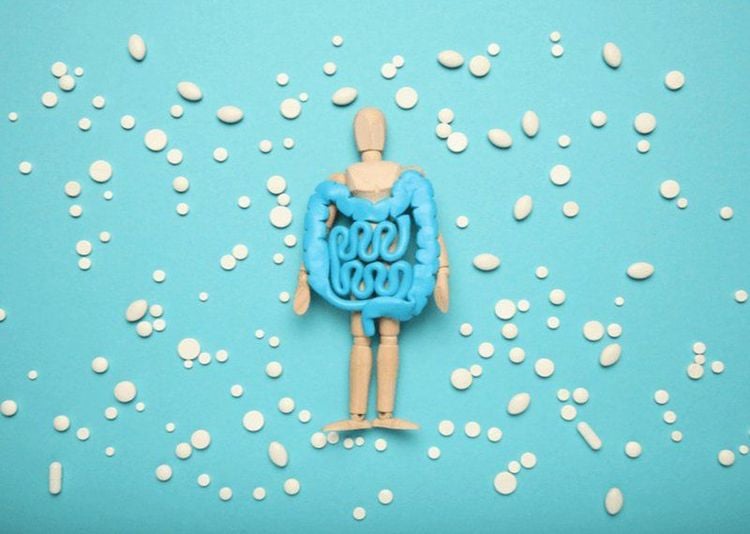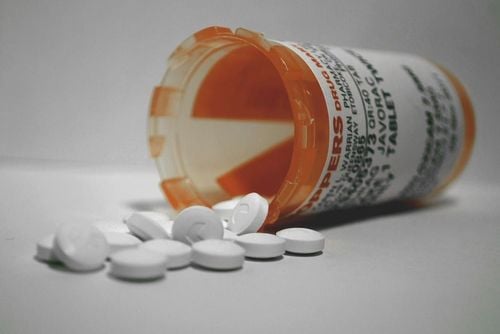This is an automatically translated article.
The article was professionally consulted with Master, Specialist Doctor II Phan Thi Minh Huong - Gastroenterologist - Department of Medical Examination & Internal Medicine - Vinmec Da Nang International General Hospital.Probiotics are live beneficial bacteria or yeast. It can be said that probiotics have a great and important effect in protecting the intestinal mucosa, increasing the amount of beneficial bacteria in the body. So, using probiotics in people with diarrhea is effective, read more articles below.
1. Effect of probiotics in the treatment and prevention of diarrhea
Probiotics are commonly known for their natural residence in your gut, but are also found in supplements and some foods. They play an important role in maintaining immune system health and protecting your body from infection and disease.Your gut microbiome can be affected positively or negatively depending on many factors such as your diet, stress and medications you take.
When gut bacteria for some reason is out of balance and the normal probiotic population is disrupted, it is likely to lead to negative health effects, increasing the risk of risk of intestinal diseases such as irritable bowel syndrome (IBS) and gastrointestinal symptoms such as diarrhea.
According to the World Health Organization (WHO) defines diarrhea as “loose or watery stools or more in a 24-hour period”. Acute diarrhea lasts less than 14 days while persistent diarrhea lasts 14 days or longer.
The addition of beneficial gut probiotics can help prevent diarrhea, treat diarrhea-related problems by regenerating and maintaining beneficial gut bacteria thereby correcting the loss of balance of the probiotic population.
Probiotics fight gastrointestinal disease-causing bacteria by competing with harmful bacteria, strengthening the immune system, and altering the intestinal environment to limit the ability of harmful bacteria to cause disease. Probiotics are the treatment of choice when combined with rehydration therapy in cases of severe diarrhea. This combination treatment reduces the length of hospital stay and begins to reduce illness within the first 24 hours.
In fact, clinical studies conducted on the treatment of diarrhea have shown the probiotic strains Lactobacillus rhamnosus, Lactobacillus reuteri and Saccharomyces boulardii to be the most beneficial. Probiotic supplements are safe for use by children and infants and have few side effects for the general population.

Probiotics chống lại các vi khuẩn gây bệnh đường tiêu hóa, giúp cho đường ruột của bạn khỏe mạnh
2. Types of diarrhea respond to probiotic use
2.1 Infectious diarrhea Infectious diarrhea is diarrhea caused by one or more infectious agents, such as bacteria or parasites. There are more than 20 different types of bacteria, viruses and parasites known to cause infectious diarrhea, including Rotavirus, E. coli and Salmonella.Infectious diarrhea is more common in developing countries, including Vietnam and can lead to death if not treated properly. Treatment includes preventing dehydration, reducing the duration of infection, and shortening the duration of diarrhea.
According to the Centers for Disease Control (CDC), Probiotics are especially effective against infections with rotavirus - the most common cause of diarrhea in infants and children.
There are eight strains of this virus, of which Rotavirus A is responsible for 90% of human cases. Rotavirus infection is not common in adults because immunity is built up against it after a rotavirus infection.
Taking an oral probiotic supplement containing a specific strain of Lactobacillus rhamnosus, can reduce the duration of viral diarrhea in both infants and young children. The proprietary strain Lactobacillus GG found in the Culturelle probiotic supplement has been observed to shorten the duration of diarrhea by 1-3 days in children.
2.2. Antibiotic-induced diarrhea Antibiotics have always been the first-line drugs used by doctors to treat a wide range of illnesses caused by bacteria. Diarrhea is one of the most common side effects of antibiotic treatment due to the disruption of the normal gut microbiota that these drugs cause.
Diarrhea caused by taking antibiotics is usually caused by the bacteria Clostridium difficile. This happens in 10 to 30% of people after a course of antibiotics. This can cause severe diarrhea and inflammation of the colon (colitis).
Probiotic formulation with Saccharomyces boulardii (S. Boulardii) and Lactobacillus has been shown to be effective in reducing the incidence of diarrhea and loose stools.
Taking probiotics before and with antibiotics can reduce the risk of diarrhea in both children and adults. It's best to wait two hours after taking an antibiotic to prevent the good bacteria from making the antibiotic less effective.
A clinical study shows that Saccharomyces boulardii can help with diarrhea caused by this infection and help prevent future infections. This is particularly beneficial because repeated infections by Clostridium difficile are difficult to control.
2.3. Traveler's Diarrhea Traveler's diarrhea is defined as three or more bowel movements per day, accompanied by at least one associated symptom, such as cramping or abdominal pain, which occurs to a traveler after they have stopped at their destination. It affects about 20 million people each year.
Traveler's diarrhea (TD) is caused by bad food, water and pathogens encountered when traveling to a new environment. Symptoms can last up to a month or more. Enterotoxigenic Escherichia coli (ETEC) is the most common cause of this form of diarrhea.
Probiotic supplements with S.boulardii, Lactobacillus acidophilus and Bifidobacterium bifidum have been shown to be most effective for this type of diarrhea.
2.4. Diarrhea in infants and young children Necrotizing enterocolitis (NEC) is an intestinal disease that occurs almost exclusively in neonates. This disease is characterized by inflammation of the intestine that leads to an overgrowth of bacteria, which severely damages the cells of the intestines and colon. NEC is a serious condition with a high mortality rate of up to 50% in neonates.
One of the most dangerous symptoms of NEC is severe diarrhea. Doctors prescribe antibiotics to treat this disease, and this can lead to antibiotic-associated diarrhea, which aggravates the patient's condition. In addition, some experts suggest that antibiotic treatment may be a factor in NEC.
Some studies have also shown that probiotics can help reduce the risk of NEC and death in premature babies. Scientists have found that certain strains of probiotics, including Lactobacillus rhamnosus GG, can also treat infectious diarrhea in children.
2.5. Certain other diarrhea conditions Another condition that causes diarrhea is inflammatory bowel disease (IBD). Probiotic Saccharomyces boulardii helps treat this condition. Probiotics have been shown to help treat ulcerative colitis and may help treat Crohn's disease.
Probiotics are also used in the treatment of irritable bowel syndrome (IBS). This syndrome is characterized by cycles of IBS-A (alternating gastrointestinal symptoms), IBS-M (mixed symptoms), constipation (IBS-C), and diarrhea (IBS-D). Saccharomyces boulardii is the recommended probiotic for IBS-D.
Saccharomyces boulardii is a probiotic probiotic that has been shown in numerous clinical trials to help people with diarrhea. For IBS-C, the probiotic Bifidobacterium and a fiber combination are recommended.
For symptoms of bloating, a common symptom of IBS, probiotic formulations with Lactococcus lactis Rosell-1058 are recommended. Bloating can also occur with overeating, food intolerances, bloating, during stressful periods before menstruation or during menstruation.

Đa số các triệu chứng tiêu chảy đều đáp ứng với việc sử dụng probiotic
3. The best yeasts to treat diarrhea
According to the latest findings of scientists, the following probiotics are the most effective strains of beneficial bacteria to treat diarrhea:Lactobacillus rhamnosus GG(LGG) : This probiotic is one of the best. most commonly added strains. Research shows that LGG is one of the most effective probiotics for treating diarrhea in both adults and children Saccharomyces boulardii : S. boulardii is a beneficial yeast strain commonly used in medicinal products. probiotic supplements. It has been shown to treat antibiotic-associated diarrhea and Bifidobacterium lactis infections: This probiotic has immune-boosting and gut-protective effects and can significantly reduce severity Weight and frequency of diarrhea in children Lactobacillus casei: L. casei is another probiotic strain that has been studied for its anti-diarrheal benefits. Some studies indicate that this probiotic treats antibiotic-associated diarrhea and infections in children and adults very well. While other probiotics may help treat diarrhea, the strains listed above have the most research on their use for this particular condition.
4. Risk of side effects
Probiotics are generally safe for both children and adults, serious side effects are least common in healthy people, some potential side effects are possible but very rare.People who are susceptible to infections, including those recovering from surgery, critically ill infants, and people with endoscopic catheters or chronic illnesses are at increased risk for the following adverse reactions: when using probiotics.
People with allergies to dairy products should avoid probiotic supplements that have been grown on a dairy-based medium. Non-dairy sources of probiotics are available, often marketed as vegan probiotic supplements.
People with immunocompromised conditions, pancreatitis or open wounds after surgery should avoid probiotic supplements as they can cause illness.
People with short bowel disease and those using urinary catheters should also avoid probiotics, unless directed by a doctor.
Using probiotics for diarrhea is a useful and well-recognized treatment. Correction of the type of diarrhea with an appropriate probiotic combination formulation is essential to achieve the best results for diarrhea management.
Talk to your doctor to learn more about the effects and side effects of probiotic supplements.
Please dial HOTLINE for more information or register for an appointment HERE. Download MyVinmec app to make appointments faster and to manage your bookings easily.
Reference source: healthline.com












